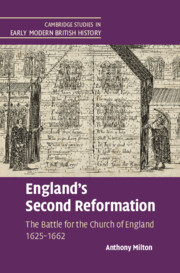Book contents
- England’s Second Reformation
- Cambridge Studies in Early Modern British History
- England’s Second Reformation
- Copyright page
- Dedication
- Contents
- Acknowledgements
- Abbreviations
- Introduction
- Chapter 1 An Unresolved Reformation
- Chapter 2 Situating the Laudian Reformation
- Chapter 3 Responses to the Laudian Reformation
- Chapter 4 The Abortive Reformation, 1640–1642
- Chapter 5 The End of Episcopalian Reformation
- Chapter 6 Reformation by Negotiation
- Chapter 7 The Westminster Reformation and the Parliamentarian Church of England
- Chapter 8 The Royalist Church of England, 1642–1649
- Chapter 9 Alternative Reformations, 1649–1653
- Chapter 10 The Cromwellian Church
- Chapter 11 Episcopalian Royalism in the 1650s
- Chapter 12 Failed Reformations, 1659–1661
- Chapter 13 The End of Comprehensive Reformation and the Caroline Settlement
- Conclusion
- Index
Chapter 3 - Responses to the Laudian Reformation
Published online by Cambridge University Press: 05 October 2021
- England’s Second Reformation
- Cambridge Studies in Early Modern British History
- England’s Second Reformation
- Copyright page
- Dedication
- Contents
- Acknowledgements
- Abbreviations
- Introduction
- Chapter 1 An Unresolved Reformation
- Chapter 2 Situating the Laudian Reformation
- Chapter 3 Responses to the Laudian Reformation
- Chapter 4 The Abortive Reformation, 1640–1642
- Chapter 5 The End of Episcopalian Reformation
- Chapter 6 Reformation by Negotiation
- Chapter 7 The Westminster Reformation and the Parliamentarian Church of England
- Chapter 8 The Royalist Church of England, 1642–1649
- Chapter 9 Alternative Reformations, 1649–1653
- Chapter 10 The Cromwellian Church
- Chapter 11 Episcopalian Royalism in the 1650s
- Chapter 12 Failed Reformations, 1659–1661
- Chapter 13 The End of Comprehensive Reformation and the Caroline Settlement
- Conclusion
- Index
Summary
Moving beyond the familiar focus on the radical puritan reaction, Chapter 3 examines the full range of expressed opposition to the Laudian programme, not just from hard-line puritans, but also from conformists including those in the senior ranks of the Church. These arguments consistently adopted a remarkably conservative mode of defending established orthodoxy in doctrine and practice against recent Laudian innovations, with even puritans invoking the Prayer Book and the 1604 Canons. Even radical presses run by sectarians abroad could juggle with more conservative rhetoric. Most of the arguments of the famous anti-Laudian puritans Henry Burton, John Bastwick and William Prynne still followed more conservative lines (despite the violence of their language) although they radicalised after their punishments. The Scottish opposition to the new Prayer Book, it is argued, was mostly directed against pre-Laudian grievances (with the exception of Robert Baillie’s Ladensium Autokatakrisis which was aimed at English MPs in the Short Parliament). The chapter also analyses the Short Parliament and opposition to the etcetera oath, noting that tactical moderation still meant that the pre-eminent (although not the sole) mode of public debate concerning the Church of England was a conservative one that left the door open for moderate reforms.
Keywords
- Type
- Chapter
- Information
- England's Second ReformationThe Battle for the Church of England 1625–1662, pp. 68 - 100Publisher: Cambridge University PressPrint publication year: 2021



